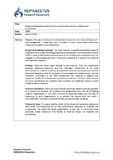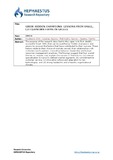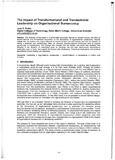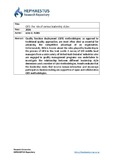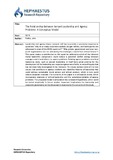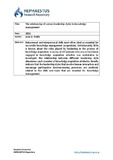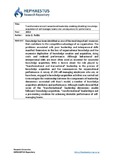Browsing School of Economic Sciences and Business by Subject "Leadership"
Now showing items 1-7 of 7
-
Dispersed leadership predictor of the work environment for creativity and productivity
(Emerald Group Publishing Limited, 2006)Purpose: This paper examines the relationship between the dimensions of dispersed – self‐management – leadership and a number of work environment dimensions conducive to creativity and productivity. Design/methodology/approach: ...
-
Greek Hidden Champions: Lessons from Small, Littleknown Firms in Greece
(Pergamon, 2000-12)The purpose of the research described in this paper is to first identify successful Greek SMEs that can be qualified as ‘hidden champions’ and second to uncover the factors that have contributed to their success. These ...
-
The Impact of Transformational and Transactional Leadership on Organisational Bureaucracy
(ACL, Academic Conferences LTD, 2005)The objective of this paper is to empirically investigate through an industry survey, the effect of transformational and transactional leadership on the dimensions of organisational bureaucracy. Results indicate that the ...
-
QFD: the role of various leadership styles
(MCB UP Ltd, 2006)Quality function deployment (QFD) methodologies, as opposed to traditional quality approaches, are most often cited as essential for advancing the competitive advantage of an organisation. Unfortunately, little is known ...
-
The Relationship Between Servant Leadership and Agency Problems: A Conceptual Model.
(Academic Conferences International Limited, 2015-11)Leadership and agency theory research still has to provide a conclusive response to questions "why do so many corporate scandals, budget deficits, and bankruptcies are witnessed in most of the OECD countries?" "Why private, ...
-
The relationship of various leadership styles to knowledge management
(MCB UP Ltd, 2001)Behavioural and interpersonal skills most often cited as essential for successful knowledge management (acquisition). Unfortunately, little is known about the roles played by leadership in the process of knowledge acquisition. ...
-
Transformational and transactional leadership enabling (disabling) knowledge acquisition of self‐managed teams: the consequences for performance
(MCB UP Ltd, 2002)Knowledge has been identified as one of the most important resources that contribute to the competitive advantage of an organisation. The problems associated with poor leadership and interpersonal skills manifest themselves ...

